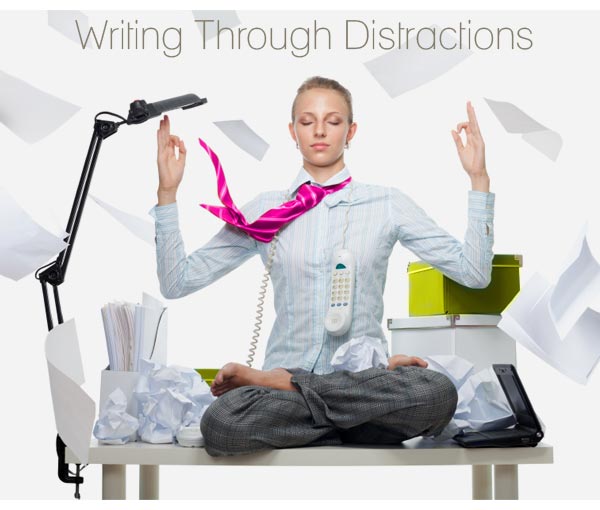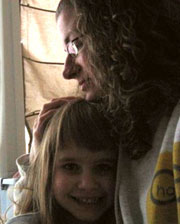|
|
         |
|
|
 |
|
 
|
 |
| |
|
|
| |
|


Writing Through the Distractions of... Mothering
By Chynna Laird
So, you have a great idea for the next New York Times Best Sellers list. You have all the ideas planned out, your characters are ready to go, and your plot is solid and fleshed out. You sit down to write then–BAM–you’re hit with: “Mooooom! Can I have a snack?” “Moooom! Where’s my __________? “Mom! Jordy hit me/looked at me/breathed on my arm/etc.”
You find yourself pulled away from your writing ideas because your mama duties come first. Then what happens? You sit to write, and everything is gone. Poof! “Oh well,” you tell yourself. “I’ll just try again later/tomorrow/next week.” But, often times, we allow our mama distractions to prevent us from getting back into it.
Believe me, I know this scenario all too well. As a mom to four children under eight, two with high special needs, I am often pulled away from my writing passion. I am what Christina Katz, author of Writer Mama: How to Raise a Writing Career Alongside Your Kids, calls a “Writer Mama.” We are just like other writers trying to make a living from our craft and dealing with all the regular distractions writers face working at home; but we have the additional full-time job of caregiving. And the distractions we deal with in mothering are a little more difficult to ignore.
I know how frustrating it can be coming up with a writing plan for the day, only to have a little voice ask for help or need something or just seek your attention. Don’t give up! I have some suggestions on how you can write through the distractions of mothering and still hold tightly onto your Mother of the Year crown. Here’s how:
Make the time: If you’re serious about wanting to get that novel done and in people’s hands or get paid for that article idea you have, you have to make the time for it. No ands, ifs, or buts. Now, if you’re like me, you may not have huge blocks of time to sit and write, but you probably have little snippets of time throughout the day you can squeeze in a bit of writing time. Think about it: nap time, while the kids are eating lunch or watching their allowed television program, sitting on the bench at the park while they play, or even going to pick your child up a little early from preschool and writing in the car while you wait. It is possible. It’s very similar to those who say they can’t save money because they don’t earn very much.
If you take a small amount of money off the top and tuck it away, you learn to live off what’s left, right? If you take a little time for your writing with those tiny snippets off the top, you can get the other things done in the time that’s left.
Set small goals: I used to be someone who had a bunch of tiny projects lying around because I only had a bit of time, but lots of ideas. I soon realized how nonproductive that was because I never got anything finished; and nothing is more frustrating for me than having piles of half-finished projects screaming for me to get to them next. If you have fifteen minutes, figure out what you can do in that amount of time. A blog post? Two query letters? A short article? A mini-chapter in your novel? Set a small goal for that time and get it done. Then you have a sense of completion and accomplishment.
TIP: I got a dry erase mat I stick on the wall. I have daily, weekly, and monthly goals I slot onto it. (You can get one at Staples for a reasonable price.) Next to that, I have my calendar for all the stuff I need to do for my kids. At the beginning of each day, I put things up on my “work” calendar I know I can get finished around what I need to do for my kids. This isn’t 100%, but it makes me feel much more organized, as I can see what’s possible for me to get done—big or small—around what has to be done. It keeps me on the realistic path.
Label your time: My kids work best with visual cues (okay, I do, too). When you find those little bits of time, make it clear that Mama needs to be left alone during this time. Either have a little picture of Mama working with “Shhh!” on it (my daughter, Jaimie, drew one for me), or have an alarm clock you set for fifteen minutes or however many minutes you have. Teach your kids that for the slot of time they see the picture up or until the alarm goes off, Mama is busy doing something; but she’ll play or get snacks when the sign comes down (or alarm bells go off).
TIP: This works great for older children; but for younger ones, they may need a bit more guidance. When my kids were younger, I had a little bin of special toys that only came out when I needed to work on something. Then it was like Christmas for them, pulling out those special toys they rarely got their hands on. Now, all my kids are old enough to entertain themselves for a short bit of time, but I still give them a list of things to choose from during Mama’s writing time. [Write out a list of activities, games, or other fun distractions, and tape it on the pantry door or on the fridge for them to go to during your assigned work time.] This greatly reduces the “I’m bored” dilemma until you are ready to entertain again.
Unplug: When you have these short snippets throughout the day, take full advantage of them. Turn the Internet connection off (or if you have WiFi, turn off your Internet window), close the e-mail, put the cell on message mode, and don’t play on the social media networks, like Facebook and Twitter. These are all time reducers. I’m not saying they are a waste of time, as we all know they have a lot of benefits, but they are major distractions and time-consuming. If possible, set special time aside—either at the beginning and/or end of the day—to check e-mails and catch up on social media.
Reduce outside noise: One of the sensory areas we still have to work on with Jaimie and my son, Xander, is auditory. They both have excellent hearing, but they aren’t able to tune things out around them in order to concentrate on a task at hand. I have the same problem. It’s easy to be distracted from your work when you not only have to deal with noise inside your house but outside as well. Sirens, other kids playing outside, construction, or just beautiful weather lure you away from your work. Find a place in your house that is the lowest traffic area, away from windows, and preferably, has a door you can close. If you have WiFi, that’s ideal because you can take your laptop anywhere.
For those without this option, just use the old-fashioned pen and pad of paper, or get yourself a NEO Alphasmart (very inexpensive keyboard writing tool) and put it on your regular computer later. I’m fortunate because in having children with auditory issues, I have some fantastic noise-reduction headphones that really help as well. Often, being able to tune out the extra noise can be enough to get us focusing and back on track.
Being a writer and a mama can be tough to balance, but it’s possible. Crazy as it sounds, I’ve been able to get daily blogging and articles done as well as completing a few books! Try some of these ideas, adjusting them to your own situation, and get some of those ideas out there. I look forward to seeing your name as a published writer very soon.
***

Chynna Tamara Laird is a psychology student, freelance writer, and multi award-winning author living in Edmonton, Alberta with her partner, Steve, their three daughters [Jaimie (eight), Jordhan (six), and baby Sophie (two)], and baby boy, Xander (four). Her passion is helping children and families living with Sensory Processing Disorder and other special needs.
You’ll find her work in many online and in-print parenting, inspirational, Christian, and writing publications in Canada, the United States, Australia, and Britain. In addition, she’s authored an award-winning children’s book (I’m Not Weird, I Have SPD), two memoirs (the multi award-winning, Not Just Spirited: A Mom’s Sensational Journey With SPD, and White Elephants), a young adult novel (Blackbird Flies), and an adult’s suspense/thriller (The Gift to be released late 2011).
-----
Related articles:
Your Home Office: Haven or Hell? 9 Tips on How to Get Some Peace & Quiet
Fighting the Time Suckers
Christina Katz on Balancing Writing and Family
Start Me Up: Chynna Laird on Starting a Home-Based Freelance Career
---------------------------------------------------------------

Getting It Done When There’s No Time To Do It
By Kathleen M. Basi
If you’re a writer, chances are you have too much to do and not enough time to do it. Whether you write from home with kids running around, in the coffee shop on your lunch break, or late at night after everyone else is in bed, interruption is a reality of modern life. Phone calls, Facebook, e-mail—disruptions break your concentration, arrest your momentum, and if you’re not careful, they can keep you from accomplishing anything at all.
Here are ten strategies I’ve used as a write-at-home mom to make good use of the time I have.
I. Break down big tasks into small ones.
In some lines of work, goals are easy to measure. Writing is not one of them. Goals like “write an article,” “finish my novel,” or “publicize my book” take weeks, months, or perhaps even years to complete. Where do you start? And even after you’ve begun, where do you start today?
I often write articles that rely heavily on first person sources to break down a larger topic. If my goal for the day reads “work on infertility article,” I waste precious minutes floundering while I try to get into a groove. Instead, I break it down into a number of smaller, more manageable tasks. For instance:
- Identify sources
- Contact sources
- Research
- Interview/s
- Cull through first person material for usable quotes
- Outline article
- Write sidebar/s
- Rough draft
- Polish
- Quote checks
For a novelist working on a new project, the task list looks different:
- Research setting
- Other research (Medical condition, effects of car accident, etc.—whatever is relevant to the plot.)
- Character sketches
- Outline primary plot
- Outline subplots
- Draft working synopsis or outline
- Write a specific scene (Some people aim for a word count, which also works.)
A novelist in the revision stage has different needs still. She might need to condense all critiques, looking for patterns. She might aim to go through the manuscript, looking for one particular element that needs work: voice, transitions, POV shift, fleshing out a subplot—the more specific the goal, the better.
Perhaps your major goal is selling a completed article, story, or novel. Instead of setting a goal of “market research” (a vague, overwhelming task, if there ever was one), try something like this:
- Study books/articles/stories already published, looking for what makes your project stand out.
- Study magazines, publishers or agents (whichever is appropriate).
- Write a “pitch” paragraph, detailing marketability of your project.
- Create a “top five” list to query, including rationale for each.
- Draft query letter.
- Polish query letter.
- Prepare and send submissions.
With a few exceptions, each of these tasks can be accomplished in a short period of time. This increases the chances of staying focused and seeing forward progress despite interruptions. The upside is measurable progress toward a larger goal. The downside—keeping track of it all, which leads me to...
II. Lists are our friends.
Tack a list to the wall, keep it in a planner, store it in the computer—whatever works best. But keep the list, and cross tasks off as you go. As much as anything, the benefit is psychological: the more you see yourself accomplishing, the more energized you become. The more energized, the more motivated you will be.
III. Prioritize.
It probably goes without saying, but not all tasks are created equal, even from one day to the next. An article on deadline trumps e-mail; but e-mail outranks next week’s article deadline, if you’re trying to set up interviews to publicize a book that’s already on the shelves (or is about to be).
IV. Identify tasks that lend themselves to constant interruption.
Certain tasks (for instance, e-mailing and research) can be done in short segments, between interruptions, without loss of effectiveness. Brainstorming is another good example. This column was roughed out on the back of a coupon while waiting in line at the grocery store, and I did two sets of edits while waiting for doctors and watching my kids play outside.
V. Identify the “golden hour.”
Now it’s time to get down to business. You know your priorities, you know what tasks you have, and you have them all on a list.
Start with the “golden hour,” the best writing time of the day. Is it early morning, while you’re fresh, and everybody else is still asleep? Is it the forty-minute commute on the train, where no one will bother you? Or is it twenty minutes at Taco Bell, spent typing furiously while you scarf down a burrito?
For me, a stay-at-home mom, the golden hour lasts from 1:15-3:15 p.m., a.k.a. “nap time.” This is the only long, relatively uninterrupted time I have during the day, so I devote it to whatever task is most pressing or requires the most concentration. The important thing is to decide, early in the day, what to do with that block of time. And when it arrives, hold it inviolate—turn the phone off, close the social networking and e-mail, and get to work.
VI. Give every block of time a “name.”
The golden hour is your major work time for the day. Use the fragments that are left to accomplish something. Early morning, at the dentist’s, while you’re waiting for the bus—it’s tempting to write off these opportunities, saying, “It’s only five minutes.” But the fact is that five minutes well spent still moves you forward. Go back to your list and choose a task that you can finish, or at least dent, in the block of time you have.
VII. Be prepared to take advantage of time when it pops up unexpectedly.
Wherever you go, take something with you to work on, in case you happen to get five minutes while you’re waiting in the car, the grocery line, or the doctor’s office. You probably won’t, but be prepared anyway. Decide early in the day which list item/s you want to tackle; so when the opportunity arises, you don’t have to waste time figuring out a strategy.
VIII. Unavailable Hands ≠ Unavailable Brain
Your brain can always be working, even if your hands can’t be typing. You can brainstorm while driving; you can imagine conversations between characters while doing dishes. If your brain needs a break, take it—but don’t forget it’s there.
IX. Keep a writing log.
When I first began to track my writing, I kept track of blocks of time and what I accomplished during each. This could get out of hand very easily. But in the short run, it’s helpful, especially if you suspect that you’re not using your time well. Knowing how long you spend on a task before you get sidetracked (by e-mail, Facebook, phone, or kids) will give you a better picture of your own productivity.
X. Be gentle with yourself.
When you sense your concentration splintering, it may be a sign that you need a break. Take it. Whatever renews your spirit also revitalizes your creativity. Even though writing is a passion, something we love doing, it is still work. And you need a break from it occasionally.
In short, an organized mind is a productive mind. A successful writing career depends on many factors, but the one that allows all the others to happen is making good use of whatever time you have. Disruptions are inevitable. Good planning, however, can minimize their impact. Go forth and be productive!
***

Kathleen M. Basi is a freelance writer from Columbia, Missouri. She writes fiction and nonfiction while navigating a house full of interruptions (also known as “children”). Her work has appeared on NPR’s All Things Considered and in Chicken Soup for the Soul: New Moms as well as several national religious publications. Her musical compositions have been published by WLP and GIA Publications.
When she’s not writing, she teaches flute and voice lessons, directs a church choir, makes family scrapbooks, experiments in the kitchen, and advocates for the disabled. Kathleen puts her juggling skills on display at www.kathleenbasi.com.
---------------------------------------------------------

Twitter, Facebook, and Tumblr: Writing Through Electronic Distractions
By Swapna Lovin
Writing a book isn’t quite what it used to be. We can all romanticize the image of J.K. Rowling sitting at a coffee shop, pad of paper and pen in hand, and writing what would become one of the biggest selling books of all time. But the fact is most writers these days don’t use a notebook to write. They use computers to pen their tomes; it’s faster, more efficient, and makes research much simpler.
However, using a computer to write turns out to be a double-edged sword. There are an infinite number of distractions on the computer that can hinder even the most dedicated of writers. Have writer’s block? Why don’t you talk to your followers on Twitter or look at cute animal videos instead of trying to work through your difficulties? It’s all too tempting to spend your days procrastinating instead of writing, and the computer (and Internet, in particular) makes that frighteningly easy.
Luckily, there are some tools, tips, and tweaks that can assist your willpower when it comes to resisting the urge to check your e-mail once more or post a fun picture to your Tumblr. The easiest method to prevent distractions is simple: deny yourself access to the Internet. The Internet is really where most of those diversions come from. Without it, you can’t check Twitter, read your favorite blogs, or watch the latest music videos on YouTube. If you disconnect all networking features on your computer, you are left only with what’s stored locally on your computer.
But let’s say you don’t want to take the drastic measure of shutting out your entire online life while writing—after all, the Internet is extremely useful for quick research. In this case, you can create a completely separate Windows profile on your computer for writing. When you login to this profile, it won’t have any of your convenient desktop shortcuts. You can even configure your desktop programs, such as your Twitter client and blogging software, so they are only available for your non-work profile. If you use the Firefox web browser, you can also create a separate profile in the browser that removes all your favorite (distracting) bookmarks. By removing direct access to your biggest electronic distractions, you can more easily focus on the writing at hand.
If you like your computer setup the way it is and don’t want to change anything, there are other tricks you can use to limit electronic distractions. Setting aside time to use the Internet and check your Facebook and Twitter feeds is a great strategy. For the last five minutes of every hour, or maybe the last fifteen minutes of every other hour, spend some time unwinding and distracting yourself to your heart’s content. When that timer buzzes (because of course, you’ll be using some sort of timer to ensure you don’t go over your allotted time), you can shut down all those fun sites and apps and get back to your writing.
It’s also a great idea to ignore your e-mail inbox. You may think you can’t do it, but it might be the best thing that ever happened to your writing productivity. Instead of looking at every e-mail when it comes in, close your e-mail program or the browser window that has your e-mail in it. Check your e-mail during your breaks, but don’t respond to anything unless urgent. Set aside an hour at the end of the day (or however long you think it will take to go through everything that’s come in over the course of one day), and respond to all your e-mail in bulk. You’ll be surprised at how much more efficient it is than reading and responding to each e-mail individually.
Another broad tip on avoiding distractions is to consider where you’re writing. Some people need the hustle and bustle of a coffee shop or café, while others crave complete silence in order to write effectively. If you find yourself easily distracted while writing, perhaps you should pick a new location to work (with a different noise level) to see if it helps you focus. If you’re really a fan of change, then maybe you should try writing in a different place every day.
If playing around on Internet websites is your particular weakness and you can’t seem to stay away, the browser Google Chrome may have just the ticket for you. There is an extension for the browser called StayFocused, which will limit the amount of time it allows you to spend browsing your favorite websites. First, you have to install it and divulge to it those sites you get lost in, only to emerge an hour later with no idea what happened or how you burned that much time. When you navigate to these sites, StayFocused will show you a timer (by default, ten minutes), and that is all the time it will allow you to spend on the website that particular day.
You can also set active days and active hours, so the program isn’t trying to limit your YouTube watching at 10 p.m. on a Saturday. It seems a little drastic, but it’s a great idea for those who are desperate for some quality writing time without distractions.
Firefox has a similar plugin, entitled LeechBlock, which will do exactly what the name implies—block the sites that leech your time. You can set it up to block the sites that you waste the most time on while trying to write. You can set up times and days for it to police your web browsing, just like StayFocused, as well as how much time per day you are allowed to visit the offending sites.
If you don’t use Google Chrome or Firefox and aren’t inclined to switch browsers just for these plugins, KeepMeOut is a website that performs a similar function. While it isn’t quite as fine-tuned and doesn’t behave as drastically as StayFocused or LeechBlock, Keep Me Out will warn you when you’re visiting a site too often. To use it, navigate to the website and input the address of your favorite time-sink website—the example on the page is Facebook. You can set up the time increments, for which you want it to function, and in the advanced settings, applicable days and times. Then you save the custom bookmark it provides and use that link to travel to your time-sucking websites—it’ll warn you if you’re visiting too often!
There are many methods to write through distractions, and only you can decide what works best for you. Some people function well with a little bit of distraction, and unplugging from the Internet would likely be detrimental to their writing. Others fall off the writing wagon with just the “ding” of an e-mail inbox; and as a result, setting up a new profile on their computer and installing a browser plugin might work best for them. Most likely, the ideal solution for you will be a mix and match of these solutions. It’s up to you how you handle electronic distractions, but there are many tools out there to help you be the most productive writer possible.
***

Swapna Krishna is a freelance writer, editor, and book reviewer for Kirkus Reviews. She lives in Arlington, VA with her husband and usually has her nose in a book.
---------------------------------------------------------------

When Writing Becomes a Drag or How to Procrastinate
By Suchi Rudra
Writing sucks. Really. I mean, what’s the point of all this time and energy you put into it? Who’s even reading this stuff, and how long are they going to remember anything you’ve said? There are plenty of more interesting things to do than meet yet another deadline for yet another editor. Like laundry. That hamper is overflowing. And the dishes are stewing in greasy water. Now that is a real challenge, and you can get your hands dirty instead of furthering the progress of carpal tunnel syndrome.
So to avoid that loathsome, unforgiving keyboard, you’re picking out slimy zucchini bits from the sink drain. The water starts to drain away, slowly, reluctantly swirling; and finally, you see the dull gleam of the stainless steel return to the surface. What happened to the days when you were so naive and giddy about writing that you couldn’t stop writing nor could you stop blabbering about writing? Those days when your friends finally learned to stop asking you, “How’s your writing going?” Why did you start writing in the first place? Do you even remember that, when you just knew, when you took the vow to commit to the glorious writerly life?
As you rinse the sink and see a bit of shine again, you can’t help but grin—now you remember. It was that story about a talking flower, a violet to be exact, back in second grade when you first published a “book” and presented it at your school’s young author conference. Unfortunately, you haven’t been to anymore authors’ conferences since then. But that was a proud day, holding up your eleven-page, purple crayon, laminated masterpiece for all to see. How much fun you had back then—making that book, writing it, coloring it, cutting it out, all handmade—something that’s virtually nonexistent for most writers these days. (Except I decided to write this article by hand on some printer paper just to see how long I’d last; and after a panicky start, my pen was flying across the page. Words were coming out faster than my quickly cramping fingers could handle.)
How incredibly simple writing used to be. Now, we are overloaded with infinite amounts of Internet advice on every detailed aspect of writing, and we spend more time reading and worried about deciding whose advice to follow (ours, of course) than actually writing.
No wonder writing’s become a drag—it used to just be about something that gave you pleasure, something that kept you occupied for hours, so you never knew where the time went. But now, with money and deadline pressure involved and the need to please editors and agents, the passion of writing has become a chore, a duty to fulfill, and an obligation so you can pay your bills.
When what you love to do becomes something unbearable and unapproachable, it’s obvious that the time has come to make a change.
Go Old School
Here’s something to start with: Dig up your oldest writing ever, your own purple crayon masterpiece, and put it on your desk or tape it to the wall in the room where you write. Scrounge around for those old Wordpad files (yes, even if they’re on a floppy disk) and for that dusty pile of Post-It note ideas for a novel that you once scribbled down in a caffeinated epiphany. Remembering why you got into this business in the first place can really help you put your current grumblings about writing into perspective and even give you that kickstart that you need. Try working on some of those ancient projects and see what happens. And, while you’re at it, why not try writing your next assignment by hand?
Jumble It Up
If getting up in the morning to write is no longer something that excites you, then how about changing the reason you get out of bed? Shift your day around as much as you can; and in the morning hours, go for a run, practice the violin, play some Nintendo DS, take your kids/dog/horse for a walk, whip up some biscotti—basically, you need to give one of your other hobbies a try, and do something you love that doesn’t pay your bills (yet).
Step Away From the Screen
Or take it a bit further and get out of town. You know, make a weekend/week/month escape, whatever your schedule allows (www.workaway.info is an incredible organization that will have you stuck to your computer for hours without writing a word!). Traveling, getting out of familiar surroundings, and encountering new and challenging circumstances can be one of the best ways to bring your mind back to a state of inspiration and excitement—not to mention you’ll have plenty of fodder for a few travel articles or short stories. Diverting your mind from its usual routine, expectations, and assumptions can bring you a clarity and awareness of yourself that you never thought possible.
Workspace Makeover
Another easy way to make a change is to clean up, reorganize, redesign, deconstruct, and reconstruct your workspace. Or even better, find a new workspace. Maybe it’s as simple as going for a walk and picking some flowers to brighten up your desk. Organize a fun shopping trip (try vintage stores, garage sales) with non-writer friends, and see what they come up with. Find a painting, desk toy, new lamp, or new paint color that will make you smile every time you sit down to write. Maybe you already have some funny writer quotes or a photo of Oscar Wilde up on the wall to inspire you. But when did you put those up? Surely, if you’ve changed since then, it’s time to change your decor as well.
If you want a real change of scenery, try out a writer’s retreat (www.resartis.org, www.poetryresourcepage.com/colonies.html). You might even return home armed with some serious ideas on how to spruce up your old writing desk.
It’s All in the Details
There will be times when your writing gets you down, even when you know you need to keep pushing through to meet deadlines. Allowing yourself to be open to new perspectives and inspirations is key to shaking things up a bit. Do something you’ve never done. Read a book or listen to a band or see a film that you normally wouldn’t. Someone once said that you should do something every day that scares you. Whether that involves listening to death metal, wearing a hat, or eating artichokes—go for it. Make those changes that you can; because after all, it’s all in the details.
A Worthwhile Struggle
Yes, writing is hard sometimes, but if you can take a step back—making a trip down memory lane or down Route 66, rearranging your desk or your entire daily routine—you are bound to find something to grab onto. You may find a refreshed perspective of what it is you’re doing, why it is that you create, and how your work as a writer is important in the world. You are the only one that can write in the unique way that you do. Deep, deep down, you know you’ve got to keep on writing; it's an integral part of whom you are. So you may as well work your way back to the writing desk, no matter what it takes.
***

Suchi Rudra, a freelance writer and expat, is currently based in Lisbon, Portugal after having spent four years in Prague, Czech Republic.
Her work has appeared in a variety of travel publications such as Transitions Abroad, Europe Up Close, International Living, Flyodoscope, and PlanetEye.com. She also writes about sustainable design, business, and education. Aside from frolicking across the globe and scribbling all about it, Suchi sings at small cafes and works on short stories. Her first novel, Kitaab, written after a year-long stay in Bombay, was published last summer by Six Gallery Press. Contact Suchi through her website: https://suchirudra.wordpress.com.
More from Suchi on WOW!: Something to Write Home About: Life as an Expat Writer
-----
Related articles:
Take a Break for Creativity
How to Combat Writer's Block
Feng Shui for Writers: How to Create the Space You Love
One Writer's Home Office Makeover
Must Haves: Writing Retreats
Recommended Resource: Empower Your Muse, Empower Your Writing Self, a four-week class by Kelly L. Stone
|
|
|
|
|